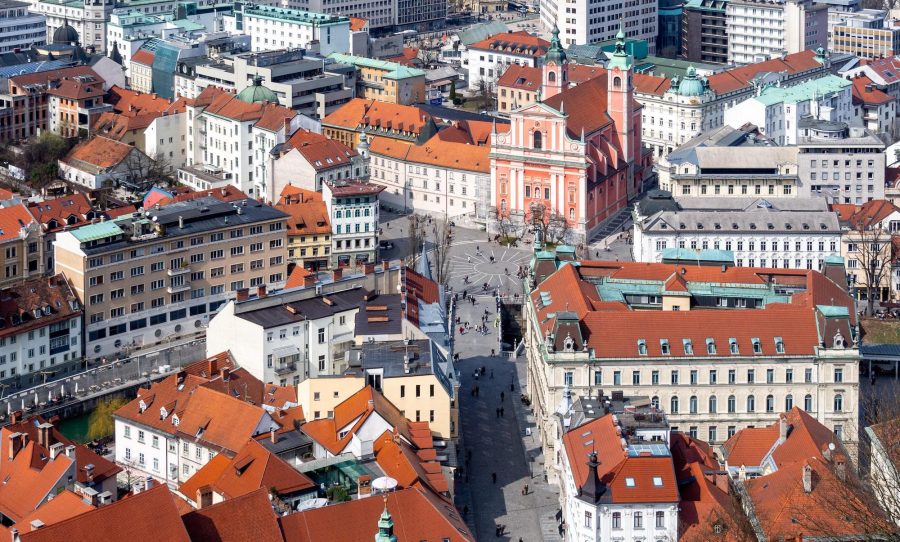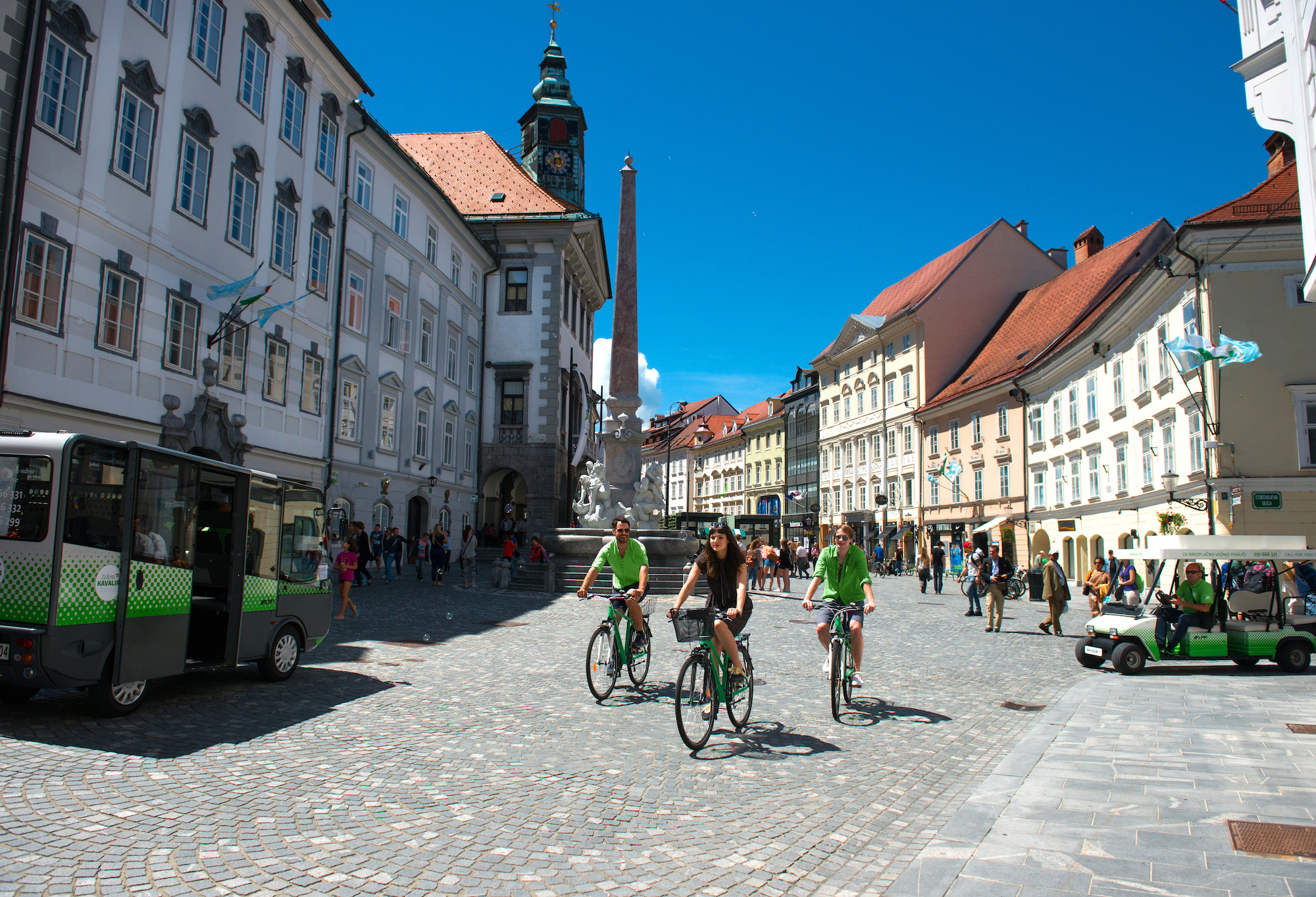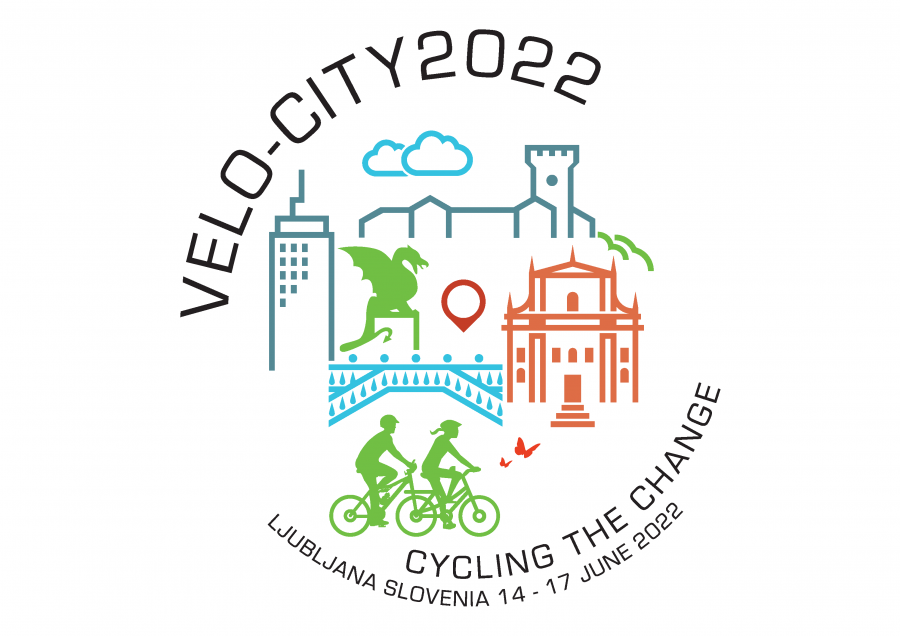Lucas Snaije, BYCS Research & Advocacy Manager, looks ahead to the Ljubljana edition of ECF’s Velo-City conference, and shares our top picks of this year’s stellar program of talks.
For a relatively small capital city, Ljubljana has definitely not let its size dictate its cycling ambitions. The Slovenian city is one of Europe’s lighthouse successes in promoting sustainable mobility, notably by closing its city centre to cars and prioritising pedestrians and cyclists over individual motorised traffic.

Image: Arial view of Ljubljana – Dimitry Anikin via Unsplash
With a cycling modal share of 16%, over 300km of bike lanes, and 800 shared bikes regularly used by 17% of its population, it’s no wonder that the Velo-City conference will be hosted there this year. Taking place on 14-17 June 2022 under the theme Cycling the Change, their team has gone above and beyond this year to produce a program brimming with over 60 sessions covering holistic approaches to cycling development.
If within one’s means, Velo-city is an obligatory event to attend for those working to promote cycling, and the BYCS team is excited to attend for the 5th time, in our 6 years of existence. Last year’s event in Lisbon was an exciting return to in-person events, where we presented our research on making cycling safe, comfortable, and fun for infants, toddlers, and their caregivers. It was a way to reconnect with the cycling community from around the world, and a space for new collaborations and relationships to flourish. This year, we will be embarking on a 16h train ride from Amsterdam towards the Slovenian capital, and look forward to presenting our research on Strengthening the Human Infrastructure of Cycling during the first parallel sessions of the event, on June 14th.
Velo-city’s programmatic quality is once again on full display. It is a challenging task to dissect the extensive agenda without doing it injustice, and tough choices will have to be made. A few sessions parallel sessions however seem of particular importance to us as we continue to build on the momentum of cycling uptake, and seek to ensure all urban residents can access and identify with such an empowering, and sustainable mobility mode.
On the first day of the event, the five years of transnational cooperation under the framework of the Civitas Handshake Initiative will be presented during the session “Civitas Handshake: Full Speed Ahead”. Involving 13 cities and 6 expert organisations, the initiative is an illustrative case for the power of collaboration and knowledge exchange. The panel session will involve speakers from Copenhagen, Krakow, Munich, Amsterdam and Helsinki, and we are looking forward to hearing half a decade of reflections. Such communities of practice are growing around the world, such as the Latin America Cycles project that we have had the pleasure of participating in, and Civitas Handshake was an undeniable inspiration to promote inclusive cycling practices at the regional level.

Image: Children biking in Ljubljana, Slovenia – Hasmik Ghazaryan Olson via Unsplash
Later that day, the session “Kids on Bikes: early practices for an active lifestyle” will take place. Another stellar panel with international speakers, from Tokyo to Paris, will discuss this important topic. It has been widely proven that starting to cycle at the earliest age ensures continuity throughout adulthood, and brings about many health benefits in the face of increased sedentarisation. Additionally, if a city is safe for a child to cycle then it will be safe for all other users.
On Wednesday the 15th, we look forward to the international conversation on “Working towards more gender equality”. Except in highly mature cycling contexts like the Netherlands, Denmark, Germany, Finland or Japan, there exists a strong gender gap in cycling that urgently needs to be addressed. While this topic feels like it deserves a plenary slot, we are excited to hear the perspectives of experts from around the world promoting cycling and working towards gender-inclusive cities.
On Thursday 16th, we are glad to see a number of important practical sessions touching upon for example how to tackle powerful car lobbies, the need for funding mechanisms to be unlocked for cycling, or the articulation of cycling and public transport. Finally, the session presented by UN-Habitat “Reclaiming Streets for Pedestrians and Cyclists in Africa” on the last day is a welcome perspective from the continent that reflects the truly global ambitions of the event, that will highlight the dynamic policies to promote cycling & walking being developed in a number of countries in the region.
Although these highlighted sessions are just a snapshot of the jam-packed program that will take place over the four days in June, they collectively emphasise the need for multifaceted approaches and diverse stakeholder involvement in order to make cycling cities safe, attractive, and accessible to all residents. We look forward to the event, to learn and exchange with advocates, cities, decision makers, researchers and industry leaders and collectively shape the future of cycling.


